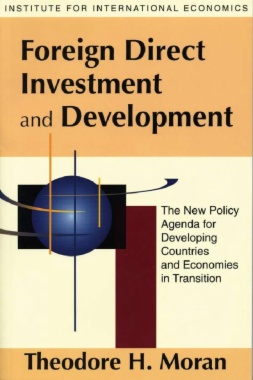Foreign direct investment (FDI) has grown dramatically and is now the largest and most stable source of private capital for developing countries and economies in transition, accounting for nearly 50 percent of all those flows. Meanwhile, the growing role of FDI in host countries has been accompanied by a change of attitude, from critical wariness toward multinational corporations to sometimes uncritical enthusiasm about their role in the development process. What are the most valuable benefits and opportunities that foreign firms have to offer? What risks and dangers do they pose? Beyond improving the micro and macroeconomic "fundamentals" in their own countries and building an investment-friendly environment, do authorities in host countries need a proactive (rather than passive) policy toward FDI?
In one of the most comprehensive studies on FDI in two decades, Theodore Moran synthesizes evidence drawn from a wealth of case literature to assess policies toward FDI in developing countries and economies in transition. His focus is on investment promotion, domestic content mandates, export-performance requirements, joint-venture requirements, and technology-licensing mandates. The study demonstrates that there is indeed a large, energetic, and vital role for host authorities to play in designing policies toward FDI but that the needed actions differ substantially from conventional wisdom on the topic. Dr. Moran offers a pathbreaking agenda for host governments, aimed at maximizing the benefits they can obtain from FDI while minimizing the dangers, and suggests how they might best pursue this agenda.
- Cover
- Contents
- Preface
- Acknowledgments
- Introduction and Synopsis
- I FDI in Developing Countries and Economies in Transition: Opportunities, Dangers, and New Challenges
- Introduction
- Ch 1 The Impact of FDI on Host-Country Development: The Heritage of Theory and Evidence
- The Benign Model of FDI and Development
- The Malign Model of FDI and Development
- Theory and Evidence about Market Structure and FDI
- Three Earlier Net Assessments of the Impact
of FDI on Development
- II Host-Country Policies to Shape Foreign Investor Activities:Investment Promotion, Domestic-Content Requirements, and Export-Performance Requirements
- Introduction
- Ch 2 Theoretical Considerations about Host-Country Intervention in Investment Promotion, Domestic-Content Requirements, and Export-Performance Requirements
- Ch 3 Foreign Firms and Host-Country Investment Promotion
- Ch 4 FDI and Domestic-Content Requirements
- Evidence about Domestic-Content Requirements
- Reasons for the Adverse Impact of Domestic-Content Requirements
- The Adverse Political Economy of Domestic-Content Requirements
- Ch 5 FDI and Export-Performance Requirements
- FDI and Exports in the Automotive Sector: Mexico, Brazil, and Thailand
- Export-Performance Requirements for Foreign Investors and Global Sourcing in the Automotive Sector: A Preliminary Assessment
- FDI and Exports in the Petrochemical Sector
- FDI and Exports in the Electronics/Computer Sector
- Export-Performance Requirements and the Globalization of the Automotive, Petrochemical, and Electronics/Computer Sectors
- Ch 6 Comparative Advantage and the Globalization of Manufacturing Industries: The Struggle to Tilt the Playing Field for International Investment
- Market Failure Rationales for Host-Country Intervention
- Second-Best Rationales for Host-Country Intervention
- Strategic-Trade Struggles and the Intersection between Trade Protection and Investment Diversion
- Policy Implications for Using Foreign Investors to Penetrate International Markets: The Dilemmas of Passivism, Escalation, and Playing for a Draw
- III Host-Country Policies to Constrain Ownership on the Part of Foreign Direct Investors: Joint-Venture Mandates and Technology-Licensing Requirements
- Introduction
- Ch 7 FDI and Joint-Venture Requirements
- Joint-Venture Requirements and Technology Transfer
- Joint-Venture Requirements and Export Performance
- Joint-Venture Requirements and Backward Linkages to the Domestic Industrial Base
- Ch 8 FDI and Technology-Licensing Requirements
- Mandatory Technology Licensing and Technological Deepening
- Technology-Licensing Requirements and Industrial Deepening
- Technology-Licensing Requirements and Enhanced Control over National Champions
- Technology-Licensing Requirements and National Security
- IV Host-Country Policies toward Natural-Resource and Private-Infrastructure Investment
- Introduction
- Ch 9 Structural Vulnerability, Imperfect Contracts, and "Political Risk" in Natural-Resource and Private-Infrastructure Projects
- Structural Vulnerability and the Obsolescing Bargain
- Multilateral Mechanisms to Enhance the Stability of Investment Agreements
- A Balance between Stability and Flexibility
- V Findings, Conclusions, and Policy Implications
- Introduction
- Ch 10 Incorporating FDI into the Development Process: From Traditional Concerns to a New Agenda for Action
- Market Failures, Market Interventions, and the Struggle for International Corporate Operations
- A New Policy Agenda toward FDI
- Tactics for Pursuing the New FDI Agenda:Following a Path of Unilateral Restraint
- Tactics for Pursuing the New Agenda toward FDI: Negotiating a Grand Bargain within a Broadened and Revised MAI
- Leadership, Vision, and a New North-South Dialogue
- References
- Index

